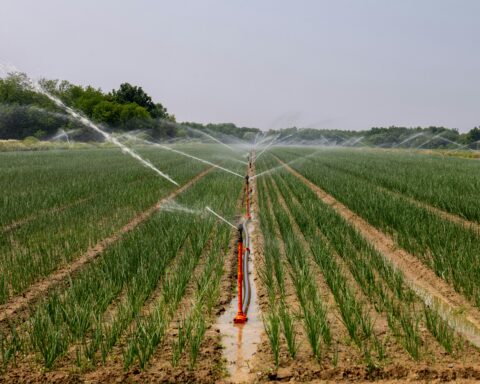Senate lawmakers have reached an agreement on a package of six funding bills that cover various government departments for fiscal year 2024. With an impending deadline approaching, both the House and Senate must approve the bills before March 9 to avoid a lapse in appropriations and potential government shutdown.
The bipartisan package encompasses six bills that include funding allocations for the departments of Agriculture, Justice, Commerce, Energy, Interior, Transportation, Housing and Urban Development, and Veterans Affairs. Congress is working on negotiations for the remaining departments budgets, with plans to vote on a second minibus by the extended March 22 deadline.
The funding bill supports programs like the Special Supplemental Nutrition Program for Women, Infants and Children (WIC), infrastructure development, veteran healthcare and scientific research, while also prioritizing safety measures, environmental conservation and support for farmers and ranchers.

Agriculture, Rural Development, Food and Drug Administration (FDA) and Related Agencies
The first bill allocates $26.2 billion for agriculture, rural development, FDA and related agencies. The funding is broken down by department and program.
The bill includes:
- $7 billion for the WIC program, a $1 billion increase from FY 2023.
- Full funding for the Supplemental Nutrition Assistance Program (SNAP), without changes to eligibility.
- Full funding for Childhood Nutrition Programs.
- $1.79 billion for the Agricultural Research Service.
- $6.72 billion in total funding for the FDA, a $44 million increase from last year.
- $1.6 billion for rental assistance, $120 million more than last year.
- $1.2 billion for the Food Safety and Inspection Service (FSIS), an increase of $32 million.
- $1.68 billion for the Food for Peace program.
Commerce, Justice, Science and Related Agencies
Commerce, Justice, Science (CJS) and related agencies will receive $68.5 billion in discretionary funding. The bill seeks to fund critical programs in public safety, economic development, scientific research and space exploration.
Key allocations include:
- The Department of Justice (DOJ) will receive $37.5 billion.
- $10.8 billion is allocated for the Department of Commerce, including programs through the CHIPS and Science Act.
- The National Science Foundation (NSF) will receive $9 billion.
- The National Aeronautics and Space Administration (NASA) will receive $24.9 billion.
Energy and Water Development
The energy and water development appropriations allocate $58.2 billion across the Department of Energy (DOE), Army Corps of Engineers, Bureau of Reclamation and independent agencies.
Key allocations include:
- The DOE will receive $17.28 billion for its non-defense programs, including the Office of Science and Renewable Energy Programs.
- The DOE will receive $32.9 billion for atomic energy defense activities and defense environmental cleanup.
- The Army Corps of Engineers will receive $8.7 billion.
- The Harbor Maintenance Trust Fund will receive $2.7 billion.
- The Bureau of Reclamation will receive $1.9 billion.
Interior, Environment and Related Agencies
The Department of the Interior (DOI), environmental and related agencies will receive $41.2 billion for departments and projects to combat natural disasters and protect tribal and public land.
The bill allocates:
- $4 billion for wildfire preparedness and suppression efforts, with $2.6 billion going to the Wildfire Suppression Operations Reserve Fund.
- $10.9 billion for Tribal programs across the Department of the Interior and the Indian Health Service (IHS).
- $14.8 billion for the DOI, including $1.4 billion for the Bureau of Land Management, $1.7 billion for the U.S. Fish and Wildlife Service and $3.3 billion for the National Park Service.
- $9.16 billion for the Environmental Protection Agency (EPA).
- $6.07 billion for the Forest Service.
Military Construction, Veterans Affairs and Related Agencies
Military construction, Veterans Affairs (VA) and related agencies are allocated $135.25 billion in non-defense discretionary funding and $172.5 billion in mandatory funding. The bill also includes advance appropriations for fiscal year 2025, including $112.6 billion for veterans’ medical care and $195.8 billion for veterans’ benefits.
Key allocations include:
- $121 billion provided for VA medical care, a $2.3 billion increase over FY 2023.
- $3.9 billion allocated for administering benefits including disability compensation, a $36 million increase over FY 2023
- $1.7 billion provided for construction to strengthen VA’s infrastructure.
- $2 billion allocated for family housing construction, maintenance, upgrades and oversight of privatized housing.
- $6.4 billion allocated for information technology systems.
- More than $1.8 billion allocated for 25 projects in the Indo-Pacific Command (INDOPACOM) theater supporting the Pacific Deterrence Initiative.
Transportation, Housing and Urban Development and Related Agencies
The bill includes $97.5 billion to the Department of Transportation (DOT), Housing and Urban Development and related agencies in discretionary funding for air and rail safety, combatting homelessness and investing in infrastructure.
Key allocations include:
- $106 billion for the DOT, which includes $27 billion in discretionary funding.
- $345 million for the RAISE Grant Program
- Federal Aviation Administration (FAA) will receive $20 billion, a $1 billion increase over FY 2023
- Federal-Aid Highways will receive $62.9 billion including $2.2 billion for Highway Infrastructure Programs
- Federal Transit Administration (FTA) will receive $16.6 billion
- $70 billion for the Department of Housing and Urban Development which is further broken down into:
- $1.25 billion for the HOME Investment Partnerships Program
- $1.3 billion for the Native American Housing Block Grant Program
- $32.4 billion for Tenant-Based Section 8 Vouchers
- $16 billion for the Project-Based Rental Assistance Program
- $8.8 billion for Public Housing Operations and Capital Needs
All news and information on this site is provided by the team at Strategic Partnerships, Inc. Check out this short 1-minute video that provides a quick overview of how we work with clients.













